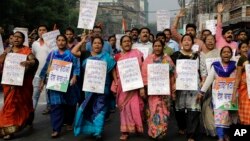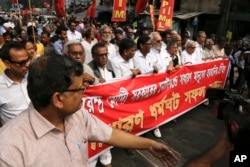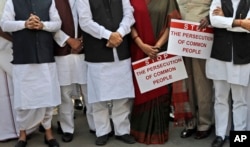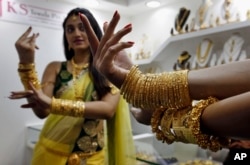In India, thousands of people led by opposition parties have staged countrywide protests against the government’s controversial measure of banning high value currency bills.
Opposition parties have criticized the unprecedented move as a “financial emergency,” but the government says the decision will deal a massive blow to corruption.
Rallies were held in major cities such as Kolkata, New Delhi, Mumbai and Bangalore, with the biggest protests being witnessed in states led by opposition parties such as West Bengal in the east and Kerala in the south.
The main opposition Congress Party dubbed the street protests the “Day of Rage.”
“Since the last 20 days, there is rage in every citizen in the country, rage among farmers, among women, among senior citizens,” said a leader of the main opposition Congress party, Ghulam Nabi Azad, in the lower house of parliament.
Parliament has also witnessed noisy disruptions in the last eight days by opposition lawmakers, who say they do not disagree with the policy of curbing illegal money, but its implementation, which has led to massive harassment of ordinary people.
Former Prime Minister Manmohan Singh has called the move “monumental mismanagement.”
Since 86 percent of India's currency was scrapped with a notice of four hours on November 8, the country has grappled with massive cash shortages, disrupting the lives of ordinary people and leading to huge bottlenecks in the informal sector where business and trade rely heavily on cash transactions.
Defending the measure in parliament on Monday, Home Minister Rajnath Singh said the government’s move “is a war against black money and the entire country has accepted it in that spirit.”
“Black” money or the “black economy” is the term commonly used in India for illegal wealth, which is estimated to be 20 percent of India’s gross domestic product or $450 billion; but, only some of it is stashed in stockpiles of cash — much of it is invested in real estate or jewelry.
Speaking at a rally a day before the protests, Prime Minister Narendra Modi hit out at opposition parties saying that “while he is trying to shut down the black economy, the opposition parties are trying to shut down the country.”
Modi has called the money ban the first of many steps he intends to take to stamp out the shadow economy.
Political gamble
Political analysts have called the measure a high stakes political gamble for Prime Minister Modi, who came to power vowing to stamp out corruption.
They say it could win him massive support if he shows some visible results in getting rid of graft in a country where anger with high-level corruption is huge, but that could easily slip away if cash shortages persist.
Ajoy Bose, an independent political analyst in New Delhi, says that for the time being Modi is getting “momentum for doing something decisive;” but, pointing to the cash crunch, Bose says, “Nobody even knows exactly the implications on the economy and the kind of distress it could cause, so it is really a very high risk thing.”




